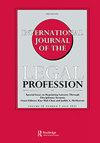The dichotomy of “first timer” and “regular” and its implications for legal advice and assistance
IF 0.9
Q2 LAW
International Journal of the Legal Profession
Pub Date : 2022-10-07
DOI:10.1080/09695958.2022.2129661
引用次数: 0
Abstract
ABSTRACT When an individual is suspected or accused of committing a criminal offence, they are brought into the realm of the criminal process. This process can be complex and alien, and the accused person may not understand – or be able to engage with – elements thereof. This paper examines how experiences of the criminal process are framed by lawyers, drawing from interviews conducted with lawyers (N = 36) as part of a larger project on the experiences of criminal justice in (south) Wales. Lawyers, when discussing the experiences of the accused, made frequent distinctions between “first timers” and “regulars”. Whilst this distinction has been touched-upon in previous studies, it has not yet been subject to much exploration and interrogation. Within this paper, we explore and critique the how and why of this distinction, querying the utility and limits of such a distinction. We argue that whilst an accused’s experience should be accounted for, it is unhelpful to frame “regulars” as not needing – or being undeserving – of attention.“初来乍到”和“正规”的二分法及其对法律咨询和援助的影响
摘要当一个人被怀疑或指控犯下刑事罪行时,他们就会被带入刑事诉讼程序的领域。这一过程可能复杂而陌生,被告可能不理解或无法参与其中的要素。本文从对律师的采访中考察了律师是如何构建刑事诉讼过程的经验的(N = 36),作为关于(南)威尔士刑事司法经验的更大项目的一部分。律师们在讨论被告的经历时,经常将“第一次”和“常客”区分开来。虽然这种区别在以前的研究中已经被提及,但它还没有受到太多的探索和质疑。在本文中,我们探讨和批评了这种区别的方式和原因,质疑这种区别的效用和局限性。我们认为,虽然应该考虑被告的经历,但将“常客”定性为不需要或不值得关注是无益的。
本文章由计算机程序翻译,如有差异,请以英文原文为准。
求助全文
约1分钟内获得全文
求助全文

 求助内容:
求助内容: 应助结果提醒方式:
应助结果提醒方式:


